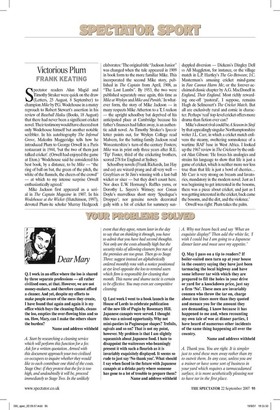Victorious Plum
FRANK KEATING Spectator readers Alan Magid and Timothy Straker were quick on the draw (Letters, 25 August, 8 September) to champion Mike by PG. Wodehouse in a matey reproach to Robert Stewart's assertion in his review of Baseball Haiku (Books, 18 August) that there had never been a significant cricket novel. Their testimonywould have cheered not only Wodehouse himself but another notable scribbler. In his autobiography The Infernal Grove, Malcolm Muggeridge tells how he introduced Plum to George Orwell in a Paris restaurant in 1944, tut the two of them just talked cricket'. (Orwell had enjoyed the game at Eton.) Wodehouse said he considered his best book, by a distance, to be Mike — "the ring of ball on bat, the green of the pitch, the white of the flannels, the cheers of the crowd" — at which to my intense surprise Orwell enthusiastically agreed.'
Mike Jackson first appeared as a serial in The Captain Magazine in 1907. In his Wodehouse at the Wicket (Hutchinson, 1997), devoted Plum-ite scholar Murray Hedgcock elaborates: 'The original title "Jackson Junior" was changed when the tale appeared in 1909 in book form to the more familiar Mike. This incorporated the second Mike story, published in The Captain from April, 1908, as "The Lost Lambs". By 1953, the two were published separately once again, this time as Mike at Wtykyn and Mike and Psmith.' In whatever form, the story of Mike Jackson — in many respects Mike Atherton to a T, I reckon — the upright schoolboy bat deprived of his anticipated place at Cambridge because his father's finances had fallen away, is an authentic adult novel. As Timothy Straker's Speccie letter points out, for Wrykyn College read Malvern, for the batting-family Jackson read Worcestershire's turn-of-the-century Fosters; Mike was in print only three years after R.E. 'Tip' Foster, third of the cricketing brothers, scored 278 for England at Sydney.
Schoolboy novels (Frank Richards, Ian Hay and co) are wizard-prang and all very well — Greyfriars or St Jim's winning with a last-ball wicket or sixer — but they don't count here. Nor does E.W. Hornung's Raffles yarns, or Dorothy L. Sayers's Wimsey; nor Conan Doyle's marvellous short story `Spedague's Dropper'; nor genuine novels decorated gaily with a bit of cricket for summery sundappled diversion — Dickens's Dingley Dell vs All Muggleton, for instance, or the village match in L.P. Hartley's The Go-Between; J.C. Masterman's amusing cricket mind-game in Fate Cannot Harm Me; or the forever-acclaimed classic chapter by A.G. MacDonell in England, Their England. Most richly rewarding one-off 'pastoral', I suppose, remains Hugh de Selincourt's The Cricket Match. But all are exclusively rural and comic in character. Perhaps 'real' top-level cricket offers more drama than fiction ever can?
Mike's closest rival could beA Season in Sinji by that appealingly singular Northamptonshire writer J.L. Carr, in which a cricket match enlivens the steamy, sweltering somnolence of a wartime RAF base in West Africa. I looked up the 1967 review in The Cricketer by the onliest Alan Gibson: 'He forces his analogies and strains his language to show that life is just a game of cricket, which is neither more nor less true than that life is just a bowl of cherries... Mr Carr is very strong on breasts and lavatories, mandatory in the modern novel. Just as I was beginning to get interested in the bosoms, there was a piece about cricket; and just as I was getting interested in the cricket, back came the bosoms, and the dirt, and the violence.'
Orwell was right: Plum takes the palm.

































































 Previous page
Previous page